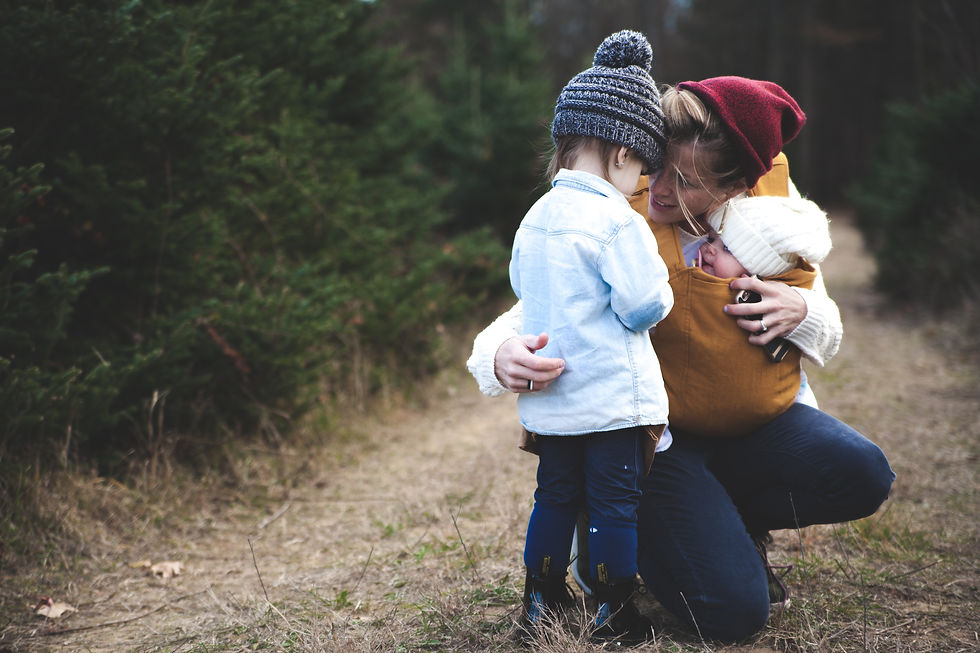What to say to someone with cancer
- Mummy's Star

- Jul 15, 2020
- 4 min read
Updated: Sep 30, 2025
This post is part of our 'Looking Back To Go Forward' series, written by a mum called Rebecca. She was diagnosed with breast cancer while pregnant with her second child. Seven years after her diagnosis and treatment, she reflects on that time, how it affected her and some of the unexpected feelings and experiences it brought up.
I’ll be the first to admit that talking to someone who has cancer can be a difficult area to negotiate. I have not always known what to say to someone who is being treated for or recovering from cancer and I have had cancer three times!
Let’s start by looking at four reasons why cancer is difficult to talk about:
1. Each person, cancer diagnosis, impact and recovery will be as the unique as the person it affects so one answer will not fit all.
2. Cancer affects people three ways; physically, emotionally and psychologically. It can be difficult to know which area to offer support in and what support maybe wanted.
3. Cancer impacts people differently each day through: diagnosis, treatment, recovery and for many years afterwards. Physical support during treatment will be very different to emotional support at the end of treatment.
4. Society and culture adds a further difficulty with many people finding it awkward or uncomfortable to talk about challenging subjects such as illness, death and mental health.
A few guidelines when talking to someone with cancer:
1. How well do you know the person? This can guide you to how much to say. Some people are very open about their cancer and some people won’t want to talk about cancer at all.
2. Look at that person and notice what you see. Are they happy, worried, sad, withdrawn, distracted or energetic? This will also guide you on how to phrase or even whether to ask a question.
3. Question your motivation, need or outcome before you ask a question. Is this about your need or the cancer patient’s? Try not to rescue or resolve the situation because this becomes about you and not them.
4. Open questions are good. How are you? What do you need? How can I support you? These allow the cancer patient to guide the conversation.
5. Saying you don’t know what to say is better than making an ill thought out comment.
6. Be wary of expressing your emotions especially fear, anger or distress. The cancer patient has enough going on trying to manage their emotions without feeling they have to address yours.
What to say and when:
Diagnosis tends to be a time of distress and shock. Let the cancer patient talk, by talking they are processing what is happening to them.
Treatment tends to be a practical time where focused and reliable offers of help are welcome. Regular texts or emails are a great way to stay in touch but not put pressure on the cancer patient to respond immediately.
End of treatment is when the emotional impact of cancer hits. There can also be emotions of abandonment, anxiety, anger and depression when the support of the medical profession withdraws. Encouraging and allowing time and space for them to express their emotions will be really helpful and help them recover.
Check ups, tests and anniversaries these are times when the previous emotions, distress and trauma can be retriggered so be aware that these may be difficult days.
Susan Silk and Barry Goodman have developed a model of support which can be useful in supporting someone in a crisis. The person having the crisis is placed in the centre with supporters surrounding them. The closer your relationships to the person in crisis the nearer you are to them. The goal is to offer support and help to people in smaller rings than you and to rant, moan and sob to those in a larger ring than you.
What annoyed me and what helped me?
It annoyed me when people began any sentence with ‘let me know if you need anything?’ I was so ill either physically or emotionally I didn’t even know if I wanted a drink! I didn’t have the strength or mental capacity to ask people to help. Specific and reliable offers of help were welcome and appreciated. I also really appreciated the time and space to be what I needed to be. If I needed to cry, rage or laugh at how shit it all was or just to go along with one of my crazy ideas. Those who allowed me unhurried freedom just to be was the greatest gift of all.
To move talking about cancer forward I suggest both the cancer patient and supporter have a responsibility in talking about cancer. The cancer patient to say what is going on for them and what they need and the supporter to respect this and show empathy and compassion.
What was helpful for you when you had cancer? How was this helpful? How did this make you feel?





Comments